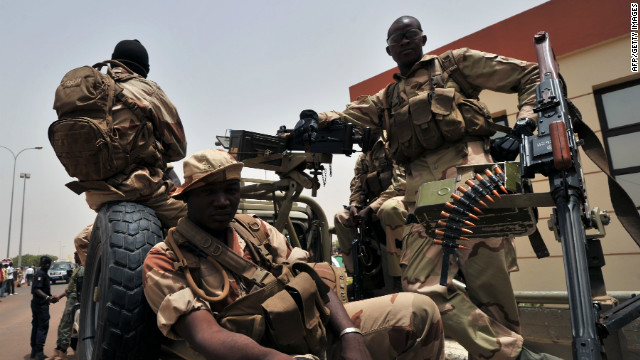Story highlights
- U.N. Security Council gives regional leaders 45 days to provide a deployment plan
- The unanimous resolution speeds up preparations for a possible intervention
- It comes amid grim reports of human rights violations in the north
The U.N. Security Council approved a resolution that gives regional leaders 45 days to provide specific plans for an international military intervention to oust rebels in northern Mali.
The unanimous resolution marks a key step and speeds up preparations for a possible intervention to retake the region from al Qaeda-linked rebels.
Mali plunged into chaos in March after a military ruler overthrew the president, shaking one of West Africa's most stable democracies.
The coup leader stepped down in May and transferred power to a civilian transitional government, but uncertainty looms.
Ethnic Tuareg rebels and Islamist militants took advantage of the chaos to seize the northern portion of the country. Months later, two groups with ties to al Qaeda toppled the Tuareg movement. The two groups now control two-thirds of northern Mali, an area the size of France.
West African states and the transitional government have asked the U.N. Security Council to authorize the military intervention.
The Security Council on Friday urged the transitional government, the rebel groups and community representatives to "engage as soon as possible" to find a peaceful political solution.
It also tasked U.N. Secretary-General Ban Ki-moon with working with West African nations and the African Union to submit to the Security Council within 45 days "detailed and actionable recommendations" in preparation for the deployment of an international military force in Mali.
United Nations officials should provide military planners to the African Union to assist with the preparations, the resolution said.
Recommendations should include the number of forces needed and estimates of how much it would cost, according to the resolution.
The resolution comes amid grim reports of human rights violations in the north.
Radical Islamists are compiling a list of unmarried mothers in northern Mali, raising fears of cruel punishments such as stoning, amputations and executions, a senior United Nations official said this week. .
Islamists controlling most of the north have vowed to impose a stricter form of Islamic law, or sharia. Local radical groups have said the law condemns relationships outside marriage.
The U.N. assistant secretary-general for human rights, who just returned from a visit to Mali, said there are reports Islamist groups are compiling lists of women who have had children out of wedlock, or who were unmarried and pregnant.
"The threat is there, it's real and people live with it and they are afraid of those lists," Ivan Simonovic said. "This could indicate that these women are at imminent risk of being subjected to cruel and inhumane punishment."
Extremists have conducted public executions, amputations, floggings and other inhuman and degrading punishments, Simonovic said.
Women and children face greater risk, he said.
More women in the region are ending up in forced marriages and the militants are also buying children and enlisting them as soldiers. They are paying the children's families $600 -- a major incentive in a country where more than half the population lives on $1.25 a day, he said.
In addition, the Islamists have also banned smoking, drinking, watching sports on television and listening to music.










